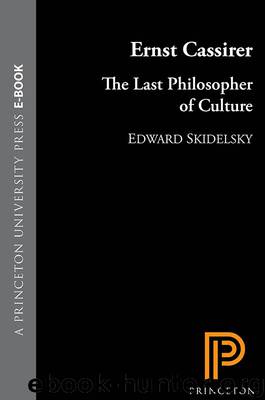Ernst Cassirer by Skidelsky Edward;

Author:Skidelsky, Edward;
Language: eng
Format: epub
Publisher: Princeton University Press
Published: 2008-05-26T16:00:00+00:00
Cassirer’s Critique of Logical Positivism
It should come as no surprise that Cassirer’s few published and unpublished criticisms of logical positivism focus on its narrowing of the concept of meaning. In volume three of The Philosophy of Symbolic Forms, it will be recalled, Cassirer derives myth from the phenomenon of expressive meaning, from the basic awareness of certain bits of matter as “alive.” This is why myth is ineliminable. However much it is transposed into the form of causal relations, it “can never wholly enter into this form and never be submerged in it—for if it did so, not only would the mythical world of demons and gods disappear, but the fundamental phenomenon of ‘livingness’ as such would vanish.”44 It is precisely this vanishing of “livingness as such” that Cassirer discerns in the philosophy of the Vienna Circle. Logical positivism is the hypertrophy of a purely physical point of view, to the exclusion of any more human perspective. It is symptomatic of the hubris of our scientific civilization.
Cassirer focuses on two related theses of Carnap: physicalism and behaviorism. Both derive from the central principle of logical positivism: the limitation of meaning to protocol sentences and sentences verifiable on the basis of protocol sentences. Physicalism stipulates in addition that these protocol sentences refer only to physical objects and events. (This represents a departure from Carnap’s earlier phenomenalism, but not a significant one, since the “physical language” and the “sense-data language” are regarded as fully inter-translatable. The physical language is preferred only on grounds of its greater convenience, as well as its traditional association with the political Left.) Physicalism, then, asserts that “every sentence of any branch of scientific language is equipollent to some sentence of the physical language, and can therefore be translated into the physical language without changing its content.”45 This claim applies, mutatis mutandis, to the sentences of psychology. Here physicalism entails behaviorism, the theory that all statements about mental states are equipollent to statements about states of the body. In Carnap’s example, the statement “Mr. A is angry” is true if and only if some other statement about Mr. A’s behavior and bodily condition is also true. Otherwise it is unverifiable and hence meaningless.46
Cassirer does not dispute that there is a necessary relation between psychic states and physical states. But he denies that this relation is captured by the logical notion of equipollence (or biconditionality) between statements referring to the one and statements referring to the other. What such an explanation misses is the fact that psychic states are expressed in states of the body, that the relation between the two is not external and accidental, but internal and intrinsic. Expression is not a compound of mental and physical but an articulated unity, from which the notions of “the mental” and “the physical” are subsequently abstracted. If this unity is denied, all access to the psychic side of Carnap’s biconditional is precluded from the outset. And if it is admitted, the biconditional is otiose.
The root of the problem is
Download
This site does not store any files on its server. We only index and link to content provided by other sites. Please contact the content providers to delete copyright contents if any and email us, we'll remove relevant links or contents immediately.
The remains of the day by Kazuo Ishiguro(7562)
Tools of Titans by Timothy Ferriss(6955)
The Black Swan by Nassim Nicholas Taleb(6199)
Inner Engineering: A Yogi's Guide to Joy by Sadhguru(5903)
Giovanni's Room by James Baldwin(5888)
The Way of Zen by Alan W. Watts(5805)
The Six Wives Of Henry VIII (WOMEN IN HISTORY) by Fraser Antonia(4795)
The Power of Now: A Guide to Spiritual Enlightenment by Eckhart Tolle(4760)
Astrophysics for People in a Hurry by Neil DeGrasse Tyson(4625)
Asking the Right Questions: A Guide to Critical Thinking by M. Neil Browne & Stuart M. Keeley(4585)
12 Rules for Life by Jordan B. Peterson(3739)
The Ethical Slut by Janet W. Hardy(3506)
Skin in the Game by Nassim Nicholas Taleb(3473)
Housekeeping by Marilynne Robinson(3406)
The Art of Happiness by The Dalai Lama(3388)
Double Down (Diary of a Wimpy Kid Book 11) by Jeff Kinney(3280)
Skin in the Game: Hidden Asymmetries in Daily Life by Nassim Nicholas Taleb(3270)
Walking by Henry David Thoreau(3236)
12 Rules for Life: An Antidote to Chaos by Jordan B. Peterson(3207)
